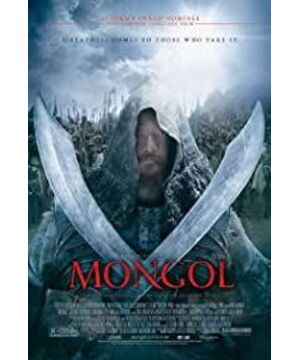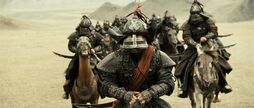This film tells the story of Temujin's defeat of the young Anda Jamu to unite the grasslands. Just like the narrative structure of the epic "The Secret History of Mongolia", after experiencing the hardships of his youth, Temujin was in the midst of the god Tengger. Under the shelter, like a soaring stock, he won the support of the steppe nomads with a simple predator philosophy when the entire steppe was plunged into an endless civil war, in that thunder and lightning, full of shamanic witchcraft and superstition On the decisive day of the battle, he defeated the Zamuhe coalition, who loved the new and hated the old in one fell swoop, and avenged the revenge of his imprisonment in the past by exterminating the Tangwuti people. The director of the Golden Horde is full of over-beautification of "Tiemujin-Tengger", the unity of nature and man, and the Ten Thousand Buddhas Dynasty. All the hardships Muzhen suffered came from the Mongolian-Turkic civil war. The occupation of Xixia (Tang Wuti) was the military need of the Mongolian army for the western and southern expeditions. The vengeance in the movie is just to find an excuse for Temuzhen's cruelty That's it - from the movie "King of Mongolia", we can still see the inspiration that the Mongolians left to European culture. Simply put: First, keep promises. The second is loyalty. The third is love. Fourth is courage. This is the basic structure of Mongolian society in the 12th century, which was parallel to the farming civilization. Especially keeping promises was not easy for the Mongolians who did not have writing in the 12th century. The structure of Mongolian society—the verbal contract—relying on the word “trust” is most evident in Temujin’s recapture of his wife, Boerte, and the raising of his illegitimate son, Zhuochi. As for loyalty, affection and bravery, it is the survival philosophy of the Mongolian art of war in which the opposite is true. It is nothing but animal husbandry management, and there is no extra space to display human wisdom and feelings. The mobilization line in the samurai movie is "give your life to me", in fact, there is still the first half of the sentence, that is, I will give your life to you. Looking back at "Empire of the Sun", the British prisoners of war paid tribute to the Japanese kamikaze, but they were just two small countries who misunderstood the spirit of Mongolia and tried to conquer the world. Don't forget that Great Britain is the savage race of Caesar's savage people who perform acrobatics on horseback and share one woman with twenty men? Western scholars equate self-seeking in Chinese culture with seclusion and isolation, which just confuses the relationship between progress and reflection. The only useful Mongolian spirit in peaceful times is personal willpower, discipline and enterprising spirit - this sounds like today's society's sarcasm for economically backward areas - but isn't it true that a gentleman keeps improving himself? ? Looking at the history of Liao, Jin, and Mongolia from a Western perspective, the most important thing is to understand the relationship between tribal civilization and conqueror empires. The term conquistador empire is a bad word, but it is the key to understanding the regional-nomadic cultural differences. It can be said that the concepts of borderless, polycentric, and pacifist in the West are all derived from this word, and its progress and limitations/disguise are also included in the meaning of this word. In short, where is my home, the world is everywhere. brothers and sisters. The brains of nomads come with a map of the world. In order to survive, they have to constantly innovate. This innovation is evident from the fact that they are dominated by Latin, French, and English. In comparison, China's inland perspective is occluded. According to the Dosang Mongolian History, China's subjugating soldiers without a fight will often be restrained when faced with ambitious tribal civilizations. If the court culture (politics) is the same in the world, then the difference between Chinese and Western civic cultures is huge. Chen Yinke said that the most important thing in Chinese culture is freedom. Everyone is different from each other, small countries and few people do not communicate with each other, if you want to enjoy it, the Chinese do not lose to anyone, but compared to the rational, participatory, and common people of the West, I always feel that there is something worse, perhaps only to return to the interior. Only at the blurred boundary between land and grassland can we find what we have lost. Looking at the history of Liao, Jin, and Mongolia from a Western perspective, the most important thing is to understand the relationship between tribal civilization and conqueror empires. The term conquistador empire is a bad word, but it is the key to understanding the regional-nomadic cultural differences. It can be said that the concepts of borderless, polycentric, and pacifist in the West are all derived from this word, and its progress and limitations/disguise are also included in the meaning of this word. In short, where is my home, the world is everywhere. brothers and sisters. The brains of nomads come with a map of the world. In order to survive, they have to constantly innovate. This innovation is evident from the fact that they are dominated by Latin, French, and English. In comparison, China's inland perspective is occluded. According to the Dosang Mongolian History, China's subjugating soldiers without a fight will often be restrained when faced with ambitious tribal civilizations. If the court culture (politics) is the same in the world, then the difference between Chinese and Western civic cultures is huge. Chen Yinke said that the most important thing in Chinese culture is freedom. Everyone is different from each other, small countries and few people do not communicate with each other, if you want to enjoy it, the Chinese do not lose to anyone, but compared to the rational, participatory, and common people of the West, I always feel that there is something worse, perhaps only to return to the interior. Only at the blurred boundary between land and grassland can we find what we have lost. Looking at the history of Liao, Jin, and Mongolia from a Western perspective, the most important thing is to understand the relationship between tribal civilization and conqueror empires. The term conquistador empire is a bad word, but it is the key to understanding the regional-nomadic cultural differences. It can be said that the concepts of borderless, polycentric, and pacifist in the West are all derived from this word, and its progress and limitations/disguise are also included in the meaning of this word. In short, where is my home, the world is everywhere. brothers and sisters. The brains of nomads come with a map of the world. In order to survive, they have to constantly innovate. This innovation is evident from the fact that they are dominated by Latin, French, and English. In comparison, China's inland perspective is occluded. According to the Dosang Mongolian History, China's subjugating soldiers without a fight will often be restrained when faced with ambitious tribal civilizations. If the court culture (politics) is the same in the world, then the difference between Chinese and Western civic cultures is huge. Chen Yinke said that the most important thing in Chinese culture is freedom. Everyone is different from each other, small countries and few people do not communicate with each other, if you want to enjoy it, the Chinese do not lose to anyone, but compared to the rational, participatory, and common people of the West, I always feel that there is something worse, perhaps only to return to the interior. Only at the blurred boundary between land and grassland can we find what we have lost.
View more about Mongol: The Rise of Genghis Khan reviews










